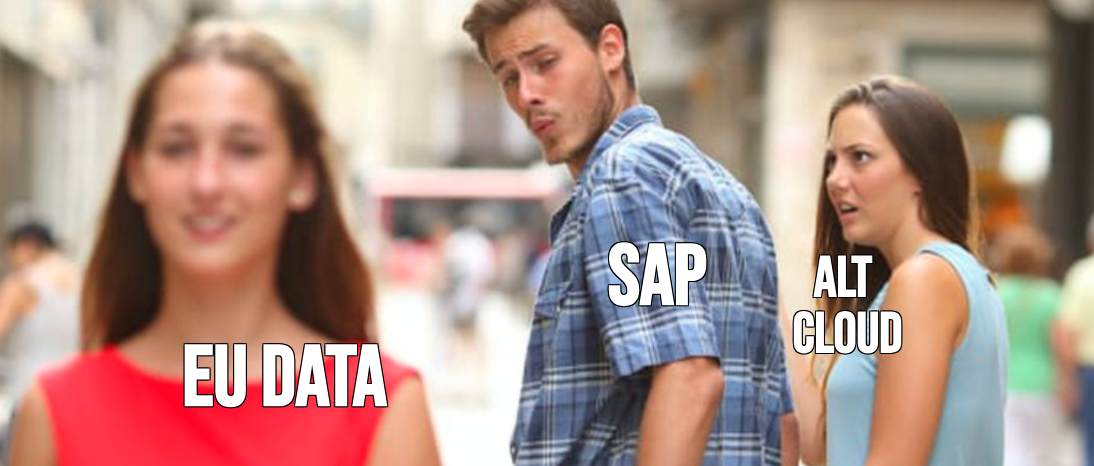- SAP announced a €20B investment in expanding its Sovereign Cloud
- The portfolio includes SAP Cloud Infrastructure, On-Site, and Delos Cloud
- All EU data to be stored within Europe to meet data protection rules
- Offerings target public sector and regulated industries
SAP’s announcement of a major expansion of its Sovereign Cloud portfolio marks a significant moment in Europe’s Cloud story—and it should serve as both an opportunity and a wake-up call for alternative Cloud providers.
The German software giant has committed more than €20 billion to build out sovereign infrastructure and services across Europe.
“With our expanded SAP Sovereign Cloud offering, SAP is unlocking access to the full spectrum of Cloud innovations and AI capabilities for all markets and industries—including the public sector and regulated environments—while ensuring these advancements are delivered in a sovereign framework and on customers’ own terms,” said Thomas Saueressig, SAP Executive Board Member.
This is not just a vendor announcement—it’s a signal that digital sovereignty has moved to the heart of enterprise Cloud strategy, particularly in Europe. And while this validates the market that many alternative providers have been serving for years, it also means the window of differentiation may be closing as global leaders sharpen their focus on local needs.
The sovereign Cloud opportunity: validated at scale
For years, smaller Cloud players have positioned themselves around compliance, locality, and customer trust. They built infrastructure close to the customer and leaned into regulations like GDPR as competitive levers against hyperscalers.
SAP’s move proves those instincts were right. The demand is not niche—it’s central to how enterprises, governments, and regulated industries want to consume Cloud. With the rise of AI, the stakes have only increased: companies want the power of generative models without exposing proprietary data to systems outside their jurisdiction.
For Europe, regulation could be the key enabler of the trust that is key to differentiation. That is certainly the view of Carme Artigas who served as the Spanish Secretary of State for AI, was co-chair of the UN Advisory Body for AI and led negotiations for the EU Artificial Intelligence Act. She shared her thoughts with MSP GLOBAL, the major international IT event taking place in Barcelona, 22-23 October; where she will be diving much deeper into these issues onstage. (Register for free!)
SAP Sovereign Cloud answers that demand with multiple deployment models, including EU-only infrastructure, on-premises private Cloud, and partnerships such as Delos Cloud in Germany. “The digital resilience of Europe depends on sovereignty that is secure, scalable and future-ready,” said Martin Merz, President, SAP Sovereign Cloud.
For alternative Cloud providers, this is validation that digital sovereignty isn’t just a compliance checkbox—it’s a growth engine.
The Cloud landscape is shifting fast
The risk is that the very thing that has set regional providers apart is now being aggressively addressed by the global players—like how when Jimi Hendrix started playing something new, so did everyone who heard him do it. Amazon, Microsoft, and Google are all moving quickly to offer sovereign Cloud solutions, while SAP is making its case as a vendor that can deliver sovereignty across the entire stack—from infrastructure to applications.
With SAP promising hundreds of localized experts, deep certification coverage, and sovereign AI capabilities, the question becomes: what’s left on the table for smaller providers to own?
Where alternative Cloud providers can still win
The opportunity for smaller and alternative Cloud providers lies in agility, specialization, and customer intimacy.
- Deep local alignment: Even as global players expand, many enterprises still value providers who understand the nuances of local law, industry specifics, and customer culture. Smaller players can move faster to address country-by-country regulatory twists.
- Vertical expertise: SAP talks about unlocking AI for “differentiated industry use cases.” Alternative providers who double down on specific industries—healthcare, energy, public sector niches—can deliver more tailored solutions than broad platforms can achieve.
- Transparent operations: Trust is built not just on compliance certifications, but on day-to-day transparency. Smaller providers can show customers exactly where their data lives and who has access.
- Partnership models: Many enterprises don’t want to abandon their local providers. Collaborating with hyperscalers—or even with SAP itself—can help smaller players stay in the game as trusted delivery partners.
The challenge will be scaling these differentiators before the gap closes further.
Timing is critical
Europe is entering a new phase of digital regulation. The AI Act will overlay fresh requirements on top of GDPR, and governments continue to push for stronger sovereignty safeguards. For alternative providers, this is a chance to cement their role before the compliance bar is reset at hyperscaler scale.
The €20 billion that SAP has earmarked for sovereign Cloud infrastructure underlines how much is at stake. Once these facilities and service models are in place, enterprises may have fewer reasons to look elsewhere.
The bigger picture: data sovereignty as a global theme
Although SAP’s announcement was focused on Europe, the themes resonate globally. Countries in Asia, Latin America, and the Middle East are all wrestling with how to maintain control over data in a deregulated US tech landscape. Local providers in those markets face the same dilemma: the demand is strong, but the hyperscalers are circling.
The CloudFest takeaway
SAP’s sovereign Cloud expansion highlights two truths for alternative providers:
- The market is real, and it’s growing. Enterprises want Cloud on their own terms, and local control is non-negotiable.
- The clock is ticking. The moment of differentiation may not last forever as global players close the gap on sovereignty and compliance.
At CloudFest, we’ve always argued that the future of Cloud isn’t just about scale—it’s about trust, proximity, and innovation tailored to customer reality. For alternative providers, this is the moment to lean harder into those strengths.



